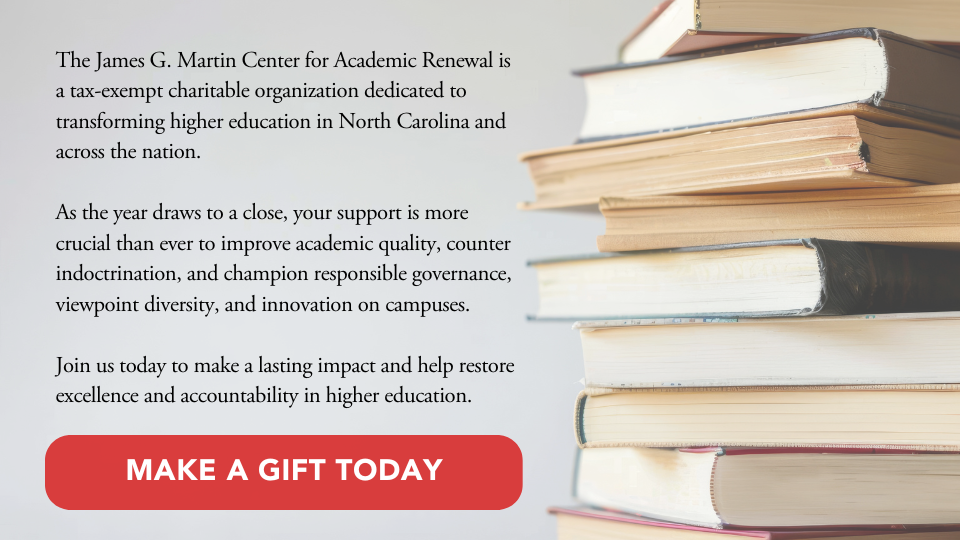 Ben White, Unsplash
Ben White, Unsplash The Martin Center’s in-house library continues to grow, boasting over 900 books and journals as of this writing. Nevertheless, a higher-ed policy institute needs a constant infusion of new titles, as the world of postsecondary education is ever-evolving. Our staff are constantly on the lookout for books that identify and analyze higher ed’s successes and failures. Here are a few titles we’d like to see under the tree this year.
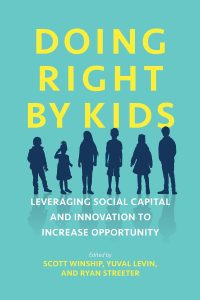 1. Doing Right by Kids: Leveraging Social Capital and Innovation to Increase Opportunity by Beth Akers, Preston Cooper, et al. (2024)
1. Doing Right by Kids: Leveraging Social Capital and Innovation to Increase Opportunity by Beth Akers, Preston Cooper, et al. (2024)
From the editors:
Material hardship among American children has never been lower. This seeming victory in the War on Poverty, however, has failed to loosen the connection between family origins and where kids end up. Children born to the most disadvantaged parents today are no less likely than in the past to become the most disadvantaged adults when they grow up…But if progressive proposals to expand the opportunities of poor kids have disappointed, the challenges those children and adolescents face have never sufficiently preoccupied the right. Conservatives are appropriately skeptical of government’s ability to influence behaviors and values or to manage initiatives effectively. Their concerns about the federal government’s proper role in social policy are well-grounded. But the moral imperative to do right by kids—to affirm the American Dream—remains…This volume provides a set of ideas to do just that. The proposals are grounded in the insight that greater opportunity requires shoring up the relationships of children and adolescents and the strength of the institutions to which they are connected—in short, rebuilding social capital. And they embrace a spirit of innovation. Expanding opportunity requires experimentation with new approaches, many of which will fail, to identify scalable effective policies. But identify them we must.
2. The Agile College: How Institutions Successfully Navigate Demographic Changes by Nathan D. Grawe (2021)
From the editors:
Demographic changes promise to reshape the market for higher education in the next 15 years. Colleges are already grappling with the consequences of declining family size due to low birth rates brought on by the Great Recession, as well as the continuing shift toward minority student populations. Each institution faces a distinct market context with unique organizational strengths; no one-size-fits-all answer could suffice.
In this essential follow-up to Demographics and the Demand for Higher Education, Nathan D. Grawe explores how proactive institutions are preparing for the resulting challenges that lie ahead. While it isn’t possible to reverse the demographic tide, most institutions, he argues persuasively, can mitigate the effects.
3. Polarized by Degrees: How the Diploma Divide and the Culture War Transformed American Politics by Matt Grossman and David A. Hopkins (2024)
From the editors:
Over the past several decades, American society has experienced fundamental changes—from shifting relations between social groups and evolving language and behavior norms to the increasing value of a college degree. These transformations have polarized the nation’s political climate and ignited a perpetual culture war. In a sequel to their award-winning collaboration Asymmetric Politics, Grossmann and Hopkins draw on an extensive variety of evidence to explore how these changes have affected both major parties. They show that the Democrats have become the home of highly-educated citizens with progressive social views who prefer credentialed experts to make policy decisions, while Republicans have become the populist champions of white voters without college degrees who increasingly distrust teachers, scientists, journalists, universities, non-profit organizations, and even corporations. The result of this new “diploma divide” between the parties is an increasingly complex world in which everything is about politics—and politics is about everything.
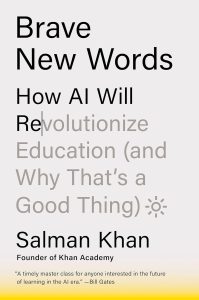 4. Brave New Words: How AI Will Revolutionize Education (and Why That’s a Good Thing) by Salman Khan (2024)
4. Brave New Words: How AI Will Revolutionize Education (and Why That’s a Good Thing) by Salman Khan (2024)
From the editors:
Whether we like it or not, the AI revolution is coming to education. In Brave New Words, Salman Khan, the visionary behind Khan Academy, explores how artificial intelligence and GPT technology will transform learning, and offers a road map for teachers, parents, and students to navigate this exciting (and sometimes intimidating) new world.
A pioneer in the field of education technology, Khan examines the ins and outs of these cutting-edge tools and how they will revolutionize the way we learn and teach…But Brave New Words is not just about technology—it’s about what this technology means for our society, and the practical implications for administrators, guidance counselors, and hiring managers who can harness the power of AI in education and the workplace. Khan also delves into the ethical and social implications of AI and large language models, offering thoughtful insights into how we can use these tools to build a more accessible education system for students around the world.
5. The Malfunction of US Education Policy: Elite Misinformation, Disinformation, and Selfishness by Richard P. Phelps (2023)
From the editors:
“Policy formation” should be an objective process. However, US education policy is formed by opportunistic “strategic scholars” promoting only their own work. Wealthy foundations, political parties, and celebrity-obsessed journalists sustain this information degradation. The Malfunction of US Education Policy examines how education suffers for it.
6. The War Against the Past: Why The West Must Fight For Its History by Frank Furedi (2024)
From the editors:
A war is being waged against the Past. Whether it’s toppling statues, decolonising the curriculum or erasing terms from our vocabulary, a cultural crusade is underway designed to render the past toxic. It is condemned as enemy territory and has become the target of venomous hate. What is at stake in provoking such a strong sense of societal shame towards Western history?
In this book, Frank Furedi mounts a fierce defence of the past and calls for a fight back against the delegitimization of its ideals and accomplishments. Casting the past as a story of shame has become a taken-for-granted outlook permeating the educational and cultural life of western society from the top down. Its advocates may see it as a cultural imperative, but a society that loses touch with its past will face a permanent crisis of identity. Squandering the wisdom provided by our historical inheritance means betraying humanity’s positive achievements. Challenging this great betrayal, Furedi argues, is one of the most important battles of our time.
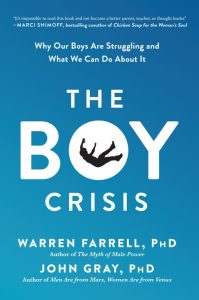 7. The Boy Crisis: Why Our Boys Are Struggling and What We Can Do About It by Warren Farrell and John Gray
7. The Boy Crisis: Why Our Boys Are Struggling and What We Can Do About It by Warren Farrell and John Gray
From the editors:
What is the boy crisis?
It’s a crisis of education. Worldwide, boys are 50 percent less likely than girls to meet basic proficiency in reading, math, and science…
It’s a crisis of purpose. Boys’ old sense of purpose—being a warrior, a leader, or a sole breadwinner—are fading. Many bright boys are experiencing a “purpose void,” feeling alienated, withdrawn, and addicted to immediate gratification.
So, what is The Boy Crisis? A comprehensive blueprint for what parents, teachers, and policymakers can do to help our sons become happier, healthier men, and fathers and leaders worthy of our respect.
8. A Republic, If We Can Teach It: Fixing America’s Civic Education Crisis by Jeffrey Sikkenga and David Davenport (2024)
From the editors:
Recent national test results reveal the sad state of civic education in our schools. The 2022 report of the National Assessment of Educational Progress showed that only 22 percent of eighth graders tested were “proficient” or better in their knowledge of civics, and proficiency in US history dropped to an anemic 13 percent. The Annenberg Policy Center reported in 2019 that only 39 percent of Americans could name the three branches of government, while its 2017 study showed that 37 percent could not name a single right in the First Amendment. How can we “keep” a republic, as Benjamin Franklin put it, if we don’t know what a republic is?
9. The House of Intellect by Jacques Barzun (1978)
From the editors:
The House of Intellect embraces: persons who consciously and methodically employ the mind, the forms and habits governing the activities in which the mind is so employed, and the conditions under which these people and activities exist.
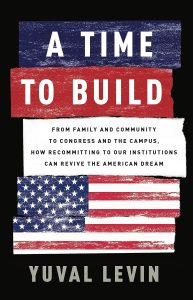 10. A Time to Build: From Family and Community to Congress and the Campus, How Recommitting to Our Institutions Can Revive the American Dream by Yuval Levin (2020)
10. A Time to Build: From Family and Community to Congress and the Campus, How Recommitting to Our Institutions Can Revive the American Dream by Yuval Levin (2020)
From the editors:
Americans are living through a social crisis. Our politics is polarized and bitterly divided. Culture wars rage on campus, in the media, social media, and other arenas of our common life. And for too many Americans, alienation can descend into despair, weakening families and communities and even driving an explosion of opioid abuse…As Levin argues, now is not a time to tear down, but rather to build and rebuild by committing ourselves to the institutions around us. From the military to churches, from families to schools, these institutions provide the forms and structures we need to be free. By taking concrete steps to help them be more trustworthy, we can renew the ties that bind Americans to one another.
Will you help stock our library this Christmas? If you would like to make an end-of-year book donation to the Martin Center, you can buy any of the ones listed above (or another of your choice) from the Martin Center’s Amazon Wish-List. Or, you can donate below to help us build our library.
Thank you for reading our work and supporting us throughout the year.
Merry Christmas to all, and to all a good night—from all of us at the Martin Center.
Jenna A. Robinson is president of the James G. Martin Center for Academic Renewal.

